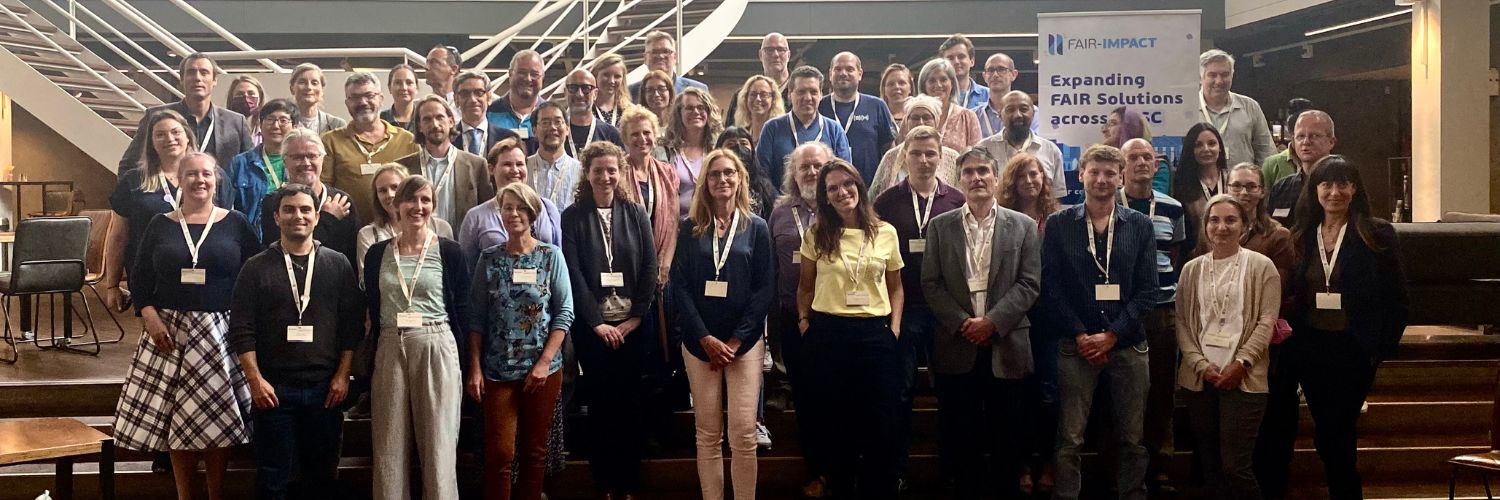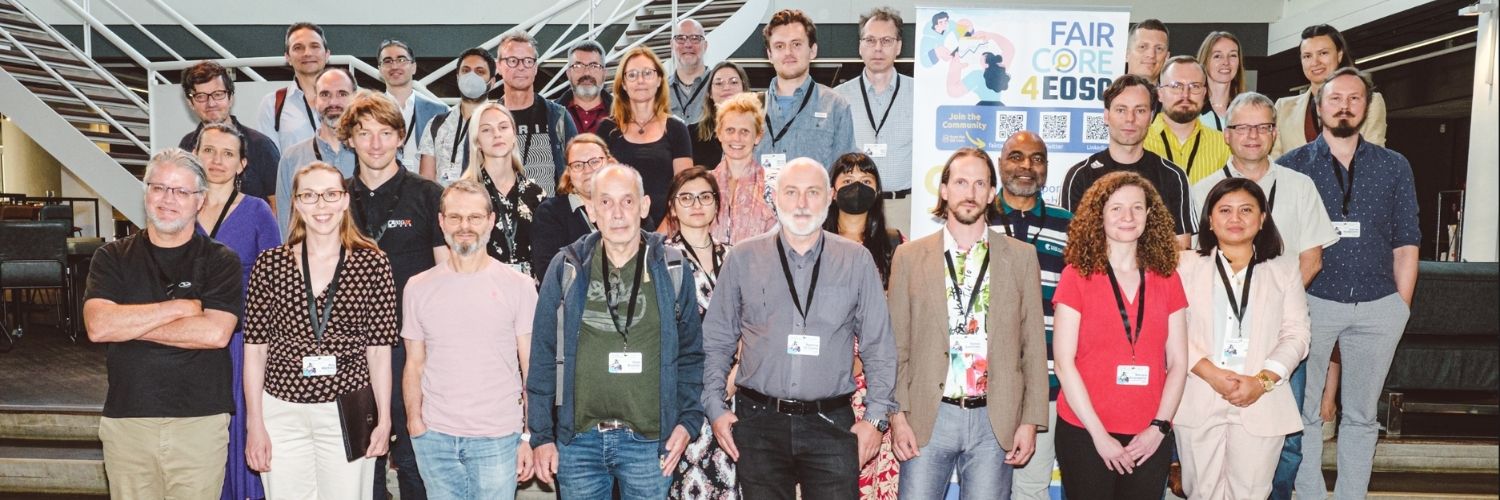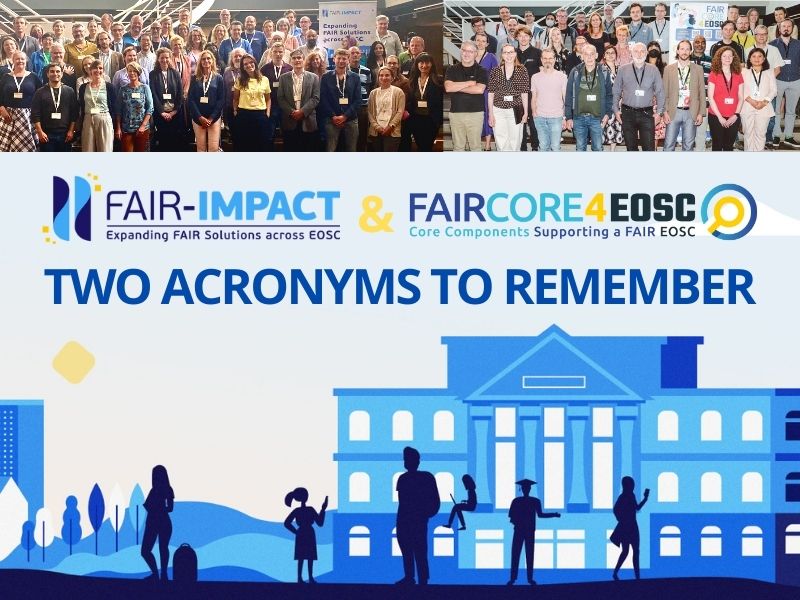A FAIR Collaboration for Open Science in Europe
In 2015 the vision of a European Open Science Cloud (EOSC) emerged. EOSC would provide an open and trusted environment for accessing and managing a wide range of publicly funded research data and related services, helping researchers reap the full benefits of data-driven science. EOSC is currently in its implementation phase (2021-2027) which requires active engagement and support to ensure widespread implementation and adoption of the FAIR (Findable, Accessible, Interoperable, Reusable) principles, to define and share standards and develop tools and services, to allow researchers to find, access, reuse and combine research results.
The FAIRCORE4EOSC and FAIR-IMPACT projects will support the realisation of this web of FAIR data and services by delivering new core infrastructure components as well as by supporting the implementation of FAIR-enabling practices, tools, and services.
FAIR-IMPACT: Expanding FAIR solutions across EOSC
The FAIR-IMPACT project will support the implementation of FAIR-enabling practices, tools and services across scientific communities and across research outputs at a European, national, and institutional level. FAIR-IMPACT will translate and adapt solutions across scientific domains on persistent identifiers, metadata and ontologies, metrics, certification and interoperability aspects via a set of integrated use cases in the social sciences and humanities, photon and neutron sciences, life sciences and agri-food, and environmental sciences. These solutions will enable repository managers, research performing organisations, funders and policy makers to support FAIR data management, and researchers and citizen scientists to produce FAIR data.. Further uptake of FAIR data principles and practices will then be boosted via cascading grants that will provide financial as well as in-kind support for a sizable number of institutions to embed FAIR components and mechanisms across domains, geographic areas, and stakeholder groups, under the supervision of a FAIR Implementation Team.
One of the challenging tasks of the FAIR-IMPACT project is to boost harmonisation, dialogue, and collaboration among the many initiatives currently active in the EOSC framework. This will be done via the Synchronisation Force, built on the successful Synchronisation Force series from the FAIRsFAIR project (fairsfair.eu), in charge of establishing a dialogue among the various projects, initiatives, and actors in both EOSC and FAIR ecosystems
"If we want to solve the societal challenges of today, we need cross-domain research that tries to understand complex systems. This means we need data that are sufficiently documented, contextualised, appropriately licensed, and interoperable.
We know that only one out of five European researchers puts the FAIR principles into practice, and the data in European repositories are not yet as FAIR as we would like them to be. FAIR-IMPACT aims to improve this situation by providing new FAIR solutions across domain and research outputs that will enable the researchers to make their data FAIR." Ingrido Dillo, FAIR-IMPACT Project Coordinator
Coordinated by DANS and supported by 27 additional partners from 11 countries, the project will build on the successful practices, policies, tools, and technical specifications from FAIRsFAIR, other H2020 projects and initiatives, and from the FAIR and other relevant Working Groups of the former EOSC Executive Board.

FAIRCORE4EOSC: core components supporting a FAIR EOSC
The brand new FAIRCORE4EOSC project will deliver nine new EOSC-Core components in support of a FAIR research life cycle, bridging the gaps identified in the EOSC Strategic Research and Innovation Agenda. Towards the establishment of a Web of FAIR data and a Minimum Viable EOSC by 2027, the components will enable an EOSC PID infrastructure, an EOSC research software infrastructure, support for sharing and access to metadata schemas and crosswalks and offer advanced research-intent driven discovery services over all EOSC repositories.
The nine FAIRCORE4EOSC components will be crucial in supporting the FAIR research life cycle. Five community-centric case studies will drive the development and testing of the new components. The selected case studies share similar challenges that are common to many other stakeholder groups, the co-design methodology will ensure the FAIRCORE4EOSC components are tailored to user needs.
The human language search into research graphs together with community views enables researchers/users to Find various different types of research outputs by converting natural language searches into graph queries and tailor entry points into graph data by e.g. organisational or topical interest. Significant advances are made to collect and harmonise metadata on software source code, allowing the Finding, Accessing and Reuse of source code relevant to science.
The Metadata Schema and Crosswalk Repository facilitates the exchange of metadata between repositories “speaking in different metadata schemas”, thereby advancing FAIR. The Data Type Repository focuses on the concrete data types, giving them PIDs for referencing in linked data and genuinely creates Interoperability by providing conversions between compatible data types. These concrete services help in making different types of research objects more FAIR, and form concrete building blocks for making the Minimum Viable EOSC a reality.
Tommi Suominen - FAIRCORE4EOSC Project Coordinator
Led by CSC–IT Center for Science in Finland, the 22 complementary partners of the FAIRCORE4EOSC consortium include service providers, research performing organisations and global expert networks. The consortium partners have long-lasting experience in the provision and development of research data services. They have also significantly contributed to the EOSC SRIA and are active members of the EOSC Association Task Forces, providing the project a unique insight and capacity to boost the development of EOSC, a Web of FAIR Data and Related Services.
Take a look at the brand new FAIRCORE4EOSC project team!

A FAIR Collaboration
FAIR-IMPACT and FAIRCORE4EOSC aim to work in close collaboration with other actors in the EOSC ecosystem, including the EOSC Association itself, the H2020 project EOSC-Future and many others.
The two projects are complementary instruments enabling an operational, open and FAIR EOSC ecosystem. Where FAIRCORE4EOSC will develop EOSC-Core components to adopt, FAIR-IMPACT in its turn will support the implementation of FAIR-enabling practices across scientific communities and research outputs at a European, national, and institutional level.
Both projects will run from June 2022 to May 2025, and will set up collaboration mechanisms via six shared partners, regular coordination and communication meetings and tools. Technical alignment between the two projects and with the broader technical EOSC infrastructure will be ensured by aTechnical Bridging Team, led by DANS and CSC, and consisting of the technical leads of FAIRCORE4EOSC, FAIR-IMPACT, EOSC Future as well as the CTO of the EOSC Association.
We interviewed both project and technical coordinators about the collaboration at the joint Kick-Off Meetings in Amsterdam this June 2022. Stay tuned for this video!
Follow FAIR-IMPACT
Website https://fair-impact.eu
Twitter https://twitter.com/fairimpact_eu
Youtube https://www.youtube.com/channel/UCz8RtVecIVYTFMJT6d9Ne0w
Linkedin Page https://www.linkedin.com/company/fair-impact-eu-project/
Follow FAIRCORE4EOSC
Website https://faircore4eosc.eu/
Twitter https://twitter.com/FAIRCORE4EOSC
LinkedIn https://www.linkedin.com/company/faircore4eosc
YouTube https://www.youtube.com/channel/UC2z1Ay3fJff12mqDckYz37w
